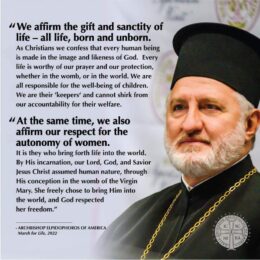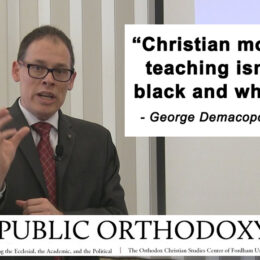FrontPageMagazine.com Walid Phares March 7, 2007
Where are the Muslim moderates?
That is a question that many in the West have been asking in recent years. Now it’s possible to provide an answer: They’re in St. Petersburg, Florida.
Between March 4 and March 7, the city is hosting the first ever Secular Islam Summit. Organized by the Center for Inquiry Transnational, an organization that promotes “science, reason, free inquiry,” as well as countless activists, the conference features more than two dozen speakers and about two hundred participants with varying religious and political backgrounds and nationalities. It is among the first conferences to bring together Muslim intellectuals for the purpose of discussing the threat of Islamic jihadism and finding secular and liberal expressions of Islam.
The opening remarks of the conference were given by two famous Western-based Muslim dissidents. First to speak was Ibn Warraq, the author of several volumes on secular Islam. In his sophisticated introduction to the Islamic “intellectual movement,” he laid out the philosophical basis for a full separation between religion and state in the Muslim world. Advocating universal values and a global reform of education, he also called for regime change in many countries, including in Iran, encouraged the formation of organizations to promote human rights in the Islamic world, and, in an interesting and twist, called on reformists to “take Mullahs to courts for issuing fatwas.”
Notably, Ibn Warraq made no attempt to justify or rationalize Islamic extremism. Considering that oft-asked question — “Why do they hate us?” — he offered an unambiguous answer: “They hate us because they were taught to do so.” Although Ibn Warraq said that he has already “left” Islam, his call for Muslim societies to undertake religious reform was compelling and urgent.
. . . more




I saw an extensive report with participant interviews on this conference. I must confess, the approach of many of the participants is so much like liberal Protestants that if I were a Muslim, I would reject them. Many of them are not talking about Islam. Some even specifically say that we have to change everything and keep the name, others are simply pushing to have their immoral life (homosexuals) approved of my Islam. How does one “reform” an entire faith without destroying it. The Christian and Jewish experience with “reformers” has not been good. I don’t think it can be done. I find therefore that the Islamic reformers are fundamentally dishonest. I do not believe that what they want an Islam are compatible. It would be far more honest and effective to just say: “Leave Islam for the following reasons….”
I find therefore that the Islamic reformers are fundamentally dishonest. I do not believe that what they want an Islam are compatible. It would be far more honest and effective to just say: “Leave Islam for the following reasons….”
Too true. Give me an honest Muslim (or Christian) over a dishonest one anyday…
Michael writes: “How does one “reform” an entire faith without destroying it.”
I think you’re on to something.
The central problem, especially for Traditional Judaism, Islam, and Christianity, is modernity. Reforms of these religions, done with the best of intentions, are typically based on concepts rooted in modernity. With modernity there is a move from the real to the conceptual, and finally to the abstract. Historical religion starts, for example, with the Resurrection. Modernity transforms that into the “concept” or image of resurrection. Eventually the image is no longer needed, and it is enough to talk about “hope.” But at that point all traces of the religion are gone. It’s not that the religion has been killed, but that it has been rendered unnecessary.
Traditional religion is vulnerable to modernity on several points:
1) historicity. Traditional religion depends on the historicity of certain events. But typically there is little actual historical evidence for those events. They were just generally believed to be true. Once challenged, there is little in the way of history to support them.
2) academic study of religion. Rather than a religion having an exclusive place, it becomes a religion that can be studied just as any other religion can be studied. Its texts can be critically analyzed just like any other text.
3) the “disenchantment” of reality (as in Marcel Gauchet’s book “Disenchantment of the World.”) Reality is no longer seen as magical. It’s not so much that people don’t believe in miracles, but that miracles are meaningless to them and no longer speak to them.
4) the rise of psychology and psychiatry as an alternative to religious explanation. (E.g., people today have epilepsy, not demon possession.)
Modernity is perceived as “attacking” traditional religion, but it really isn’t. It’s just that in the context of modernity traditional religion becomes increasingly ignored. It’s not that people disbelieve in traditional religion, but that it doesn’t mean anything to them. For example, I suppose you could say that we don’t believe in Zeus and Thor. But it would be more accurate to say that we simply don’t think about them.
As traditional religion becomes increasingly ignored (e.g. “assimilation” of American Jews) the challenge is how it can be reformed without becoming unneeded. I don’t have a good answer to that. Of course the answer of many traditional religionists is to continue to stridently defend the faith, and to attack those who are perceived as enemies. But that just makes believers appear not only increasingly antique, but hateful as well. (E.g., the wrath of God is impressive coming from Yahweh, but churlish when coming from Christopher).
Note 3. Jim writes:
Actually, it may be modernity’s difficulty with religion that is the problem, particularly modernity’s inaccesibility to the transcendent as the source of meaning and morals.
Fr. Hans writes: “Actually, it may be modernity’s difficulty with religion that is the problem, particularly modernity’s inaccesibility to the transcendent as the source of meaning and morals.”
That is certainly a legitimate view. Metropolitan Anthony Bloom said in his book on prayer (going from memory here, I don’t have the book in front of me) that modern thinking deals only with the surface of reality, missing the depth. As I recall even Carl Jung (again, going from memory) said that the psychological problems of many people were at root religious problems.
I hope everyone realizes that I’m not trying to start an argument here. But there is the fact of modernity. Arguing against modernity is like arguing against the weather. Denouncing “modernists” or “secularists” is useless, and often unproductive and negative.
Personally, I would like to see more positivity from traditional religious folk. I would like to see less condemnation and damnation. Would it make a difference? I don’t know. It might be a start. Doesn’t Galatians say that “the fruit of the Spirit is love, joy, peace, longsuffering, gentleness, goodness, faith . . .?”
Jim, the real difference is not in any of the criteria you list but in the fundamental understanding of man in society that the traditional view embodies and the modern view of man. Your paraphrase of Met. Anthony is indicative. The anthropoligical reductionism of modernity is at the root. Unfortunately, that reductionism is quite seductive as it essentially elimnates any genuine accountablity for one’s own actions. We are “free”. The slavery of the soul that follows such “freedom” is first ignored, then becomes invisible to the modern mind. When someone who has allowed the source of Tradition to pentrate even just a little and begins to call out that the Emperor has no clothes, the reaction is predictable.
To the modern mind, the Mind of traditional Christianity, whose source is the Holy Spirit, is literally insane. Of course, the reverse is also true. How does one coverse across such a divide. As one tries the very words used have drastically different meanings, even opposite meanings.
Jim, Phil, bob, et. al. If you wish to know the truth, the power and eternal beauty of the old ways do not analyze the words of we poor sinners who comment here as we are often an afront to God. Look and learn from the lives of those who really lived the truth, who walked in the ancient ways in the midst of modernity. I name only a small handful, but they are the shinning representatives of that for which we all should strive:
St. John, Wonderworker of Shanghai and San Franciso whose incorrupt body lies in repose in the Joy of All Who Sorrow Cathedral in San Franciso and St.Raphael of Brooklyn. Do not forget Mother Maria of Paris and Fr. Alexander Men of Russia who fell, guiltless victims, to the cruelest ideologies of the modern mind—not to mention the thousands who perished in the Gulag testifying to our Savior and His Church by their humble lives. Look also to one such as Fr. George Calciu, a modern confessor who endured the evil pschyic tortures of the Romanian communists for simply speaking the truth of Christ without fear and of course, Mother Teresa. It is to these men and women that we all should look for the proof of Holy Tradition. Much like Gandalf in the cavren before the Balrog, they stand before the unspeakable evils of our time declaring, “Thou shall not pass”
Read this testimony by one who also walked in the ancient ways, Richard Wurmbrand: Pastor Richard Wurmbrand was an evangelical minister who spent fourteen years in Communist imprisonment and torture in his homeland of Romania. In 1945, when the Communists seized Romania and attempted to control the churches for their purposes, Richard Wurmbrand immediately began an effective “underground” ministry to his enslaved people and the invading Russian soldiers. He was eventually arrested in 1948. Richard spent three years in solitary confinement, seeing no one but his Communist torturers. Pastor Wurmbrand was released in a general amnesty in 1964. Realizing the great danger of a third imprisonment, Christians in Norway negotiated with the Communist authorities and paid for his release from Romania. In May 1966, he testified in Washington before the Senate’s Internal Security Subcommittee and stripped to the waist to show eighteen deep torture wounds covering his body. What follows is a small part of the many experiences he had while he was imprisoned.